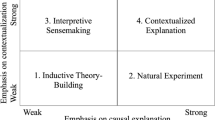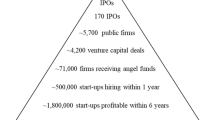Abstract
Narrative sequence methods offer the potential to advance research methods and develop a common vocabulary for theory development in international entrepreneurship. While variables-focused, variance-based methods currently dominate theory development, they are atemporal, yet entrepreneurship is what entrepreneurs do over time. We examine the assumptions of variance-based approaches and compare them to those of narrative methods, which leads to a discussion of the nature of causal mechanisms. We then illustrate the use of narrative sequence methods to identify some of the mechanisms underlying the internationalisation of an intermediary in the electronic component industry, where internationalisation is interpreted as a form of innovation and entrepreneurship. We illustrate how these methods, whose value is being increasingly recognised, allow us to introduce time, timing and temporal processes into the systematic analysis of business behaviour and evolution, and to generate usable knowledge for managers and policymakers.





Similar content being viewed by others
References
Abbott A (1990) A primer on sequence methods. Organ Sci 1(4):375–392
Abbott A (1995) Sequence analysis: new methods for old ideas. Annu Rev Sociology 21:93–113
Abbott A (1996) Mechanisms and relations. In: Symposium on social mechanism. Stockholm pp 6–7
Abbott A (2001a) The idea of outcome. Paul Lazarfield Centennial Conference, Columbia University
Abbott A (2001b) Time matters: on theory and method. The University of Chicago Press, Chicago
Abbott A, Hrycak A (1990) Measuring resemblance in sequence data: an optimal matching analysis of musicians careers. Am J Sociol 96(1):144–185
Abbott A, Tsay A (2000) Sequence analysis and optimal matching methods in sociology. Sociol Methods Res 29(1):3–33
Abell P (1987) The syntax of social life: theory and method of comparative narratives. Oxford University Press, Oxford
Abell P (1993) Some aspects of narrative method. J Math Sociol 18(2–3):93–134
Abell P (2004) Narrative explanation: an alternative to variable-centred explanation? Annu Rev Sociology 30:287–310
Andersson P (2002) Connected internationalisation processes: the case of internationalising channel intermediaries. Int Bus Rev 11:365–383
Augier M, March JG (2004) Models of a man: essays in memory of Herbert A. Simon. The MIT Press, Cambridge
Axelrod R (1984) The evolution of cooperation. Basic Books, New York
Azevedo J (1997) Mapping reality: an evolutionary realist methodology for the natural and social sciences. State University of New York Press, Albany
Bennett A, George AL (2005) Case studies and theory development in social sciences. The MIT Press, Boston
Bhaskar R (1986) Scientific realism and human emancipation. Verso, London
Bunge M (1997) Mechanisms and explanation. Philos Soc Sci 27(4):410–465
Buttriss GJ, Wilkinson IF (2004) From “Snap-shots” to “Moving Pictures”: tracing processes using narrative sequence analysis in the evolution of an E-business. IMP conference, Copenhagen, 2–4 September 2004
Buttriss G, Wilkinson I, Andersson P, Mattsson L-G (2005) Mapping mechanisms of internationalisation. IMP (Asia), Phuket, 9–12 December 2005
Carley KM (1996) Artificial intelligence within sociology. Sociol Methods Res 25(1):3–30
Coviello NE, Jones MV (2004) Methodological issues in international entrepreneurship research. J Bus Venturing 19:485–508
Dubois A, Gadde L-E (2002) Systematic combining: an abductive approach to case research. J Bus Res 55:553–560
Easton G (2003) One case study is enough. The Management School, Lancaster University, Lancaster
Emirbayer M (1996) Durkheim’s contribution to the sociological analysis of history. Sociol Forum 11:263–284
Emirbayer M (1997) Manifesto for a relational sociology. Am J Sociol 103(2):281–317
Gaddis JL (2002) The landscape of history: how historians map the past. Oxford University Press, New York
George AL, Bennett A (2005) Case studies and theory development in the social sciences. MIT Press, Cambridge
Gladwell M (2000) The tipping point: how little things can make a big difference. Little, Brown and Company, Boston
Glennan S (2000) Rethinking mechanistic explanation. Department of Philosophy and Religious Studies, Butler University, Indianapolis
Hedström P, Swedberg R (eds) (1998) Social mechanisms: an analytical approach to social theory. Cambridge University Press, Cambridge
Heise DR (1990) Modeling event structures. J Math Sociol 18(2–3):183–190
Jervis R (1997) System effects: complexity in political and social life. Princeton University Press, Princeton
Jones MV, Coviello NE (2005) Internationalization: conceptualizing an entrepreneurial process of behavior in time: J Int Bus Stud 36(3):284–303
Judd KL, Tesfatsion L (eds) (2006) Handbook of computational economics, vol 2: agent-based modeling. North Holland, Amsterdam
Krieger N (1994) Epidemiology and the web of causation: has anyone seen the spider? Soc Sci Med 39(7):887–903
Langley A (1999) Strategies for theorizing from process data. Acad Manage Rev 24(4):691–710
Langton CE (1989) Artificial life: the proceedings of an interdisciplinary workshop on the synthesis and simulation of living systems (1987). Addison Wesley, Los Alamos
Lindgren K (1997) Evolutionary dynamics in game theoretic models. In: Arthur WB, Durlauf SN, Lane DA (eds) The economy as an evolving complex system II. Addison Wesley, Reading
Machamer P, Darden L, Craver CF (2000) Thinking about mechanisms. Philos Sci 67:1–25
Mahoney J, Rueschemeyer D (eds) (2003) Comparative historical analysis in the social sciences. Cambridge University Press, Cambridge
McDougall PP, Oviatt BM (2000) International entreprenuership: the intersection of two research paths. Acad Manage J 43(5):902–908
McKelvey B (2004) Toward a complexity science of entrepreneurship. J Bus Venturing 19:313–341
Mintzberg H (2005) Developing theory about the development of theory. In: Smith KG, Hitt MA (eds) Great minds in management. Oxford University Press, New York
Nisbett RE (2003) The geography of thought. Nicholas Brealey, London
North D (1990) Institutions, institutional change and economic performance. Cambridge University Press, New York
Pettigrew AM (1997) What is a processual analysis? Scand J Manag 13(4):337–348
Pierson P (2003) Big, slow-moving, and invisible: macro-social processes in the study of comparative politics. In: Mahoney J, Reuschemeyer D (eds) Comparative historical analysis in the social sciences Cambridge University Press, Cambridge
Pierson P (2004) Politics in time: history, institutions, and social analysis. Princeton University Press, Princeton
Pierson P, Skocpol T (2002) Historical institutionalism in contemporary political science. In: Katznelson I, Milner H (eds) Political science: the state of the discipline, centennial edition. Norton, New York
Platt J (1992) Cases of cases...of cases. In: Ragin CC, Becker HS (eds) What is a case? Exploring the foundations of social inquiry. Cambridge University Press, Cambridge
Poole MS, Van de Ven AH (eds) (2004) Handbook of organisational change and innovation. Oxford University Press, New York
Ragin CC (1992) “Casing” and the process of social inquiry. In: Ragin CC, Becker HS (eds) What is a case? Exploring the foundations of social inquiry. Cambridge University Press, Cambridge
Rescher N (1995) Luck: the brilliant randomness of everyday life. Farrar Straus Giroux, New York
Roberts C (1996) The logic of historical explanation. Pennsylvania State University Press, University Park
Sabherwal R, Robey D (1993) An empirical taxonomy of implementation process based on sequences of events in information system development. Organ Sci 4(4):548–576
Sayer A (2000) Realism and social science. Sage, London
Skocpol T (1979) States and social revolutions: a comparative analysis of France, Russia, and China. Cambridge University Press, Cambridge
Sterman JD (2000) Business dynamics: systems thinking and modelling for a complex world. McGraw-Hill, New York
Stinchcombe A (1968) Constructing social theories. Harcourt, Brace, and World, New York
Stinchcombe AL (1991) The conditions of fruitfulness of theorizing about mechanisms in social science. Philos Soc Sci 21(3):367–388
Tilly C (2001) Mechanisms in political processes. Annu Rev Pol Sci 4:21–41
Van de Ven AH, Engleman RM (2004) Event and outcome driven explanations of entrepreneurship. J Bus Venturing 19:343–358
Vaughan D (1992) Theory elaboration: the heuristic of case analysis. In: Ragin CC, Becker HS (eds) What is a case? Exploring the foundations of social inquiry. Cambridge Univesity Press, Cambridge
Wason D (2003) Battlefield detectives. Granada, London
Wilkinson IF (1990) Toward a theory of structural change and evolution in marketing channels. J Macromark 10:18–46
Wolfram S (2002) A new kind of science. Wolfram Media, Champaign
Yin RK (2003) Case study research, 3rd edn. Sage, Thousand Oaks
Author information
Authors and Affiliations
Corresponding author
Rights and permissions
About this article
Cite this article
Buttriss, G.J., Wilkinson, I.F. Using narrative sequence methods to advance international entrepreneurship theory. J Int Entrepr 4, 157–174 (2006). https://doi.org/10.1007/s10843-007-0012-4
Published:
Issue Date:
DOI: https://doi.org/10.1007/s10843-007-0012-4




